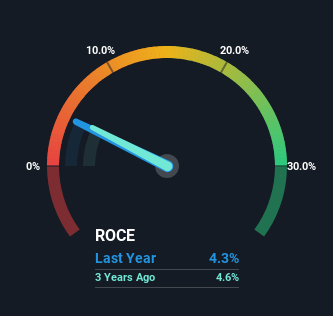Returns On Capital At Chorus (NZSE:CNU) Have Hit The Brakes
If you're not sure where to start when looking for the next multi-bagger, there are a few key trends you should keep an eye out for. Firstly, we'll want to see a proven return on capital employed (ROCE) that is increasing, and secondly, an expanding base of capital employed. Ultimately, this demonstrates that it's a business that is reinvesting profits at increasing rates of return. In light of that, when we looked at Chorus (NZSE:CNU) and its ROCE trend, we weren't exactly thrilled.
What Is Return On Capital Employed (ROCE)?
For those who don't know, ROCE is a measure of a company's yearly pre-tax profit (its return), relative to the capital employed in the business. The formula for this calculation on Chorus is:
Return on Capital Employed = Earnings Before Interest and Tax (EBIT) ÷ (Total Assets - Current Liabilities)
0.043 = NZ$246m ÷ (NZ$6.1b - NZ$430m) (Based on the trailing twelve months to December 2023).
So, Chorus has an ROCE of 4.3%. In absolute terms, that's a low return and it also under-performs the Telecom industry average of 7.3%.
Check out our latest analysis for Chorus
In the above chart we have measured Chorus' prior ROCE against its prior performance, but the future is arguably more important. If you'd like, you can check out the forecasts from the analysts covering Chorus for free.
What The Trend Of ROCE Can Tell Us
There hasn't been much to report for Chorus' returns and its level of capital employed because both metrics have been steady for the past five years. It's not uncommon to see this when looking at a mature and stable business that isn't re-investing its earnings because it has likely passed that phase of the business cycle. So unless we see a substantial change at Chorus in terms of ROCE and additional investments being made, we wouldn't hold our breath on it being a multi-bagger. On top of that you'll notice that Chorus has been paying out a large portion (380%) of earnings in the form of dividends to shareholders. These mature businesses typically have reliable earnings and not many places to reinvest them, so the next best option is to put the earnings into shareholders pockets.
The Key Takeaway
In summary, Chorus isn't compounding its earnings but is generating stable returns on the same amount of capital employed. Since the stock has gained an impressive 73% over the last five years, investors must think there's better things to come. However, unless these underlying trends turn more positive, we wouldn't get our hopes up too high.
One final note, you should learn about the 4 warning signs we've spotted with Chorus (including 2 which are a bit unpleasant) .
While Chorus may not currently earn the highest returns, we've compiled a list of companies that currently earn more than 25% return on equity. Check out this free list here.
Have feedback on this article? Concerned about the content? Get in touch with us directly. Alternatively, email editorial-team (at) simplywallst.com.
This article by Simply Wall St is general in nature. We provide commentary based on historical data and analyst forecasts only using an unbiased methodology and our articles are not intended to be financial advice. It does not constitute a recommendation to buy or sell any stock, and does not take account of your objectives, or your financial situation. We aim to bring you long-term focused analysis driven by fundamental data. Note that our analysis may not factor in the latest price-sensitive company announcements or qualitative material. Simply Wall St has no position in any stocks mentioned.
Have feedback on this article? Concerned about the content? Get in touch with us directly. Alternatively, email editorial-team@simplywallst.com

 Yahoo Finance
Yahoo Finance 
